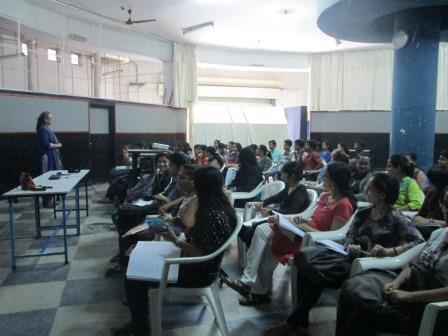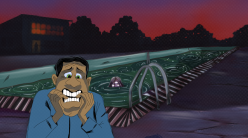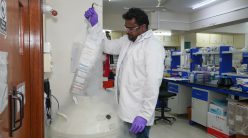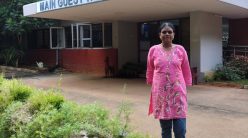A science education initiative at the planetarium, which IISc faculty members contribute to, strives to turn more local students into scientists

On a sunny Saturday afternoon, as hundreds of chattering kids throng the Jawaharlal Nehru Planetarium to gaze at the stars, a small group of college students makes their way down to the planetarium’s basement lecture hall where Narmada Khare is teaching a class on “the molecules that make life”. Khare, an undergraduate biology instructor at IISc, has been spending the previous few Saturdays introducing them to the basics of genetics. “They mentioned that they wanted to learn more about development next, so today, I am beginning with biomolecules,” she says.
Khare’s classes are part of the planetarium’s popular Research Education Advancement Programme (REAP), a two-year weekend programme aimed at encouraging local undergraduate students to develop a passion for pursuing research. Organized by the Bangalore Association for Science Education (BASE), it is geared not just towards making them understand scientific concepts better, but also to train them to think like a researcher.
“I try to tell them about the scientists, how these ideas evolved, the stories behind the discoveries,” says Khare. “A few times, I ask them, if this was the question, how would they go about solving it? Or, if this was the observation, what would the question be?”
Students who sign up for the programme spend a couple of hours each weekend learning from and interacting with practising scientists, who explain fundamental scientific concepts in a more informal and interactive setting than their college classrooms. Courses in biology and physics are organized separately (REAP in Physical Sciences, and “Bio-REAP”). Students in the physics programme also have the opportunity to pursue a research project after two years.
Over the last two decades, the programme has roped in dozens of leading scientists from across Bangalore to volunteer their time over the weekend teaching the students. In addition to faculty members at Raman Research Institute, Indian Institute of Astrophysics and International Centre for Theoretical Sciences, many physics faculty members from IISc have been involved with the programme for several years. Faculty members from the Division of Biological Sciences also played a key role in setting up the Bio-REAP initiative, and continue to coordinate the programme.
Nurturing local talent
In the early ‘90s, noted physicist Bala Iyer, then at RRI, used to spend his evenings and weekends at the planetarium explaining physics concepts to a handful of enthusiastic undergraduate students. He was later joined by particle physicist S Lokanathan, currently retired from the University of Rajasthan.
“Both Prof Iyer and Prof Lokanathan were committed to the cause of science education,” says Madhusudan HR, senior scientific officer at BASE. Working with the late founder-director of the planetarium, CV Vishveshwara, they identified core concepts that are important for a career in research and began teaching regular weekend classes, gradually giving shape to a formal programme in 2000.
REAP classes typically begin at the start of the academic year, and attendees are mostly undergraduate students from in and around Bangalore. With growing popularity, the programme has also been getting students from places such as Shimoga, Tumkur, Kolar and Bagalkot in recent years, says Madhusudan.
Several IISc faculty members from the Department of Physics and Centre for High Energy Physics (CHEP) have been teaching there since its inception.
“I used to teach quite regularly from 1995 till about 2010,” says Rohini Godbole, Professor, CHEP, whose classes usually focused on developments in theoretical physics. “The students one talked to were very enthusiastic and truly interested in science.”
The programme is tailored for first year and second year BSc students, but attendees come from a variety of backgrounds, says V Venkataraman, Chair, Department of Physics, IISc. “Right now, in my class, there are students from second year BSc, first year MSc, and from engineering,” he says. “The common thread is that they are coming voluntarily. That makes them more interested in what we are talking about and makes them want to learn more.”
As the physics programme grew in popularity, around 2006, BASE decided to organize a similar initiative for biology. At that time, S Mahadevan, Professor at the Department of Molecular Reproduction, Development and Genetics, IISc, was already volunteering for weekend study sessions, and offered to help set it up. A committee was then formed including several faculty members from IISc, and an initial three-year programme titled “Bio-REAP” was formulated, which later changed to a two-year programme.
“The idea was to nurture local talent. Students from Bangalore were not getting into science and into major scientific institutions including IISc,” says Dipankar Nandi, Professor at the Department of Biochemistry, IISc, who was the Bio-REAP coordinator until recently. “The effort was part of giving back to the city.”
The programme is typically broken up into several four- to five-week course modules spread over two years. It usually starts with ecological sciences, moves on to basic sciences such as cell biology and biochemistry, and ends with translational areas such as immunology and neurobiology.
Most of the current Bio-REAP instructors are IISc faculty members. However, faculty from other institutes too, such as Anindya Sinha of National Institute of Advanced Studies, Sanjay Sane of National Centre for Biological Sciences, and KN Ganeshaiah and several others from University of Agricultural Sciences have been teaching at the programme for several years. Many students who attended Bio-REAP over the years have spent their summers in IISc labs. Some of them have completed their PhDs from the Institute. Graduate students from IISc have also taught a few classes at Bio-REAP.
“Not a tutorial centre”
At its core, the programme seeks to inculcate a deeper understanding and appreciation of science, and not merely coach students to clear PhD entrance exams, according to Madhusudan. There are no screening tests for applicants, and students sign up for the programme purely out of interest. About 120-130 students sign up for the classes initially, but by the fifth or sixth class, the number trickles down to about 35-40, he points out. “We make it very clear to them that this is not a tutorial centre.”
The informal setting also gives students the opportunity to study science without the pressure of exams or deadlines, delve deeper into concepts within their curriculum, and also learn more about topics not in their syllabus. “It was much more rigorous than the college level exposition that we would get,” recalls Vijaykumar Krishnamurthy, faculty member at ICTS, who attended REAP classes when he was pursuing BSc at MES College, Bangalore. Bala Iyer, for example, would pick up a textbook from the US undergraduate curriculum and solve those problems, he says. “Because it was taught by active scientists, it made a huge difference hearing about something from someone who actually uses it in their daily work.”
Apart from interactions with leading scientists and connections with scientific institutions, students also get to learn more about the various career options available to them after graduation, says MRN Murthy, Professor at the Molecular Biophysics Unit, IISc, the current Bio-REAP coordinator.
“I was interested in research since 10th standard, but I didn’t know where to go, what to do. I don’t come from a family with a scientific background,” says Krishnamurthy. “The connections that opened up to various scientific institutes really made a difference.” He went on to pursue his PhD at IISc under Sriram Ramaswamy, complete postdoctoral stints at Yale University and the Max-Planck Institute, and then take up a faculty position at ICTS, Bangalore. He has also been teaching at REAP for the last three years.
Ranjani Vishwanatha, another REAP graduate, credits the programme’s approach to honing the students’ thinking process for her successful admission into IISc’s Integrated PhD programme.
“It definitely trained us to see how we should attempt the interviews, what we should look for, how should we start thinking about research or solve problems in general,” she says. “Even though the training was in physics, it helped me attend chemistry interviews and exams. I don’t think I would have directly qualified without this kind of ‘thinking process’ training.” Vishwanatha did her Integrated PhD under DD Sarma, Professor at the Solid State and Structural Chemistry Unit, IISc, and is currently a faculty member at JNCASR. She has also returned to teach at REAP.
Like Krishnamurthy and Vishwanatha, about 100 “REAPers” have gone on to pursue successful research careers in India and abroad since its inception, says Madhusudan.
“When I joined IISc, I was the only integrated PhD student from Bangalore in the ten years that the programme had been running,” says Vishwanatha. “Now I can see that every year, there are at least a few people coming in to Bangalore institutes for PhD and Integrated PhD programmes from REAP.”




